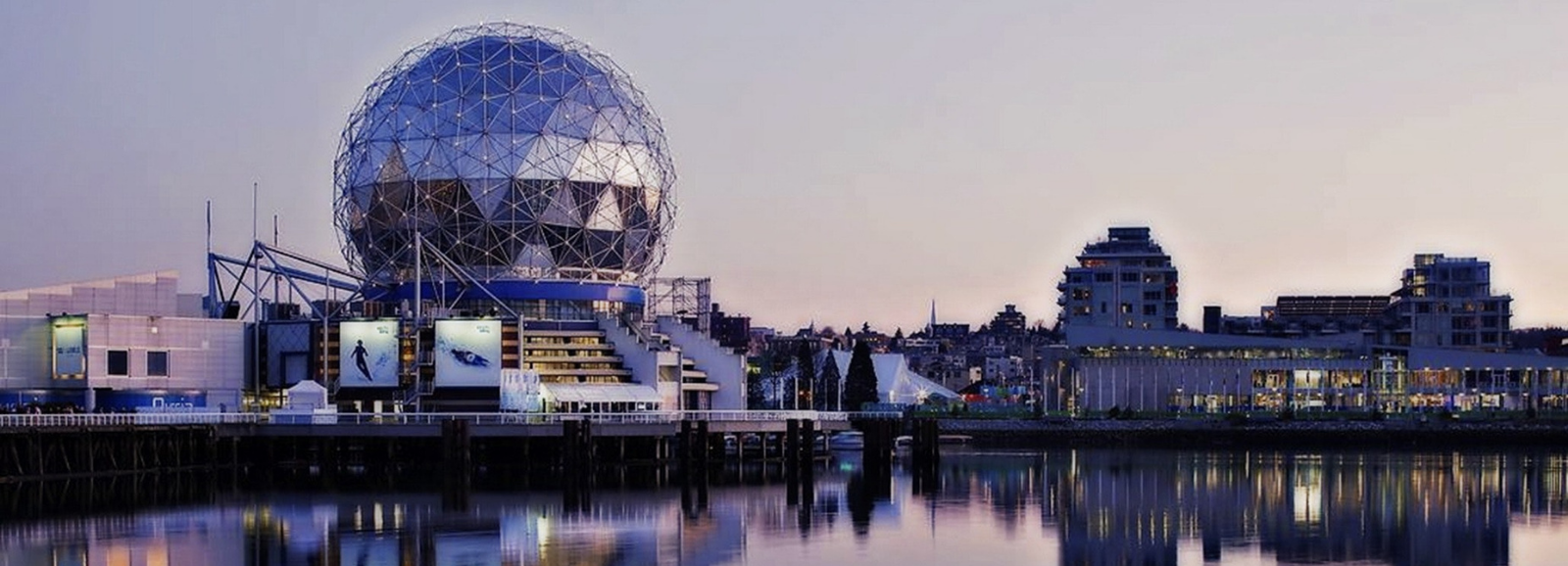
Vancouver is the largest city in Western Canada, located at the southwestern corner of the province of British Columbia. Situated between the North Shore and Coast Mountains and the edge of the Pacific Ocean, Vancouver is recognized as one of North America’s most beautiful cities.
The vibrant downtown core offers all of the amenities of an international destination, from hundreds of restaurants and clubs, to countless parks and recreation facilities and world-class entertainment. UBC’s downtown campus at Robson Square is also located in the heart of the city.
Warmed by Pacific Ocean currents and protected by a range of mountains, Vancouver’s weather is mild year-round. Maximum temperatures hover between 68 °F and 73 °F (low 20’s Celsius) in summer and a mild 46 °F during the Winter. Vancouver experiences significant rainfall with November to March being the wettest period and summer the driest.
Based on the 2016 Canadian Census, the population for the City of Vancouver is around 631,486.
Greater Vancouver has a population of around 2.4 million accounting for 53% of BC’s total population of 4.6 million.
Federal government departments provide service in English and French, but most of the population speaks English as either a first or second language.
The City of Vancouver is quite cosmopolitan, and is a mix of many multicultural groups. Because the city is multicultural, it’s also multilingual on an unofficial level. Vancouverites speak many different languages and many follow the traditions of their native lands, sometimes moderating them with Canadian culture.
93% of Vancouver residents speak English, 16% speak Cantonese, 11% speak Mandarin, and 10% speak French.
Greater Vancouver, like all major cities, runs 24 hours a day, seven days a week. The main workdays are Monday to Friday, from roughly 8 am to 6 pm - but hours vary for each organization or business. Retailers are usually open seven days a week, and most stores are open from 9:30 am to 6 pm each day-except Thursday and Friday, when they are open until 9 pm. A number of large retail stores, nearly every hotel and motel, and several restaurants, remain open around the clock.
Vancouver is in the Pacific Time Zone. Daylight savings time is in effect from the second Sunday in March until the first Sunday in November.
Currency, Traveller’s Cheques, Taxation
We recommend all visitors use Canadian currency when traveling within Canada. Visitors can exchange currency at Canadian chartered banks, trust companies, credit unions, or at offices of foreign exchange brokers, but it is advised to have local currency on hand prior to arriving. Some hotels, merchants, restaurants and suppliers accept US or other foreign currency at a pre-determined rate, which may differ from the daily rate posted by financial institutions.
Traveller’s cheques in Canadian dollars are the safest and most convenient way to carry money. They are widely accepted and can be cashed at banks or foreign exchange brokers. Identification may be required when cashing travelers cheques.
Most purchases in British Columbia will be subject to a 7% Provincial Sales Tax (PST) and a 5% Goods and Services Tax (GST), with the exception of liquor (10% GST).
Check the exchange rates at leading banking institutes and smaller downtown currency exchange bureaus. While you can find out banks’ rates online, many of the smaller currency exchange bureau rates can change hourly and are posted on their window currency boards. Always make sure there are no commission or transaction fees added to the exchange rate. When you have seen the lowest rate, I suggest you visit your regular bank and ask them to match this rate. Most banks are customer friendly and appreciate your business and will match the rate. This is the easiest method, as the cash is automatically withdrawn from your account in exchange for the foreign currency.
The Vancouver Bullion & Currency Exchange also consistently offer the best rate with fast and efficient service. Payment options include the convenience of bank debit cards as well as cash and bank drafts.
The Vancouver transit system, TransLink, Buses, the SkyTrain, Canada Line, SeaBus, West Coast Express, AquaBus, and False Creek Ferries. TransLink provides transit services covering over 1,800 square kilometres of the Greater Mainland of Vancouver—getting around the city is convenient, easily accessible and often provides beautiful views of the city!
Fares
Greater Vancouver is divided into three fare zones for all transit services (with the exception of West Coast Express). Zones are in effect each morning until 6:30 PM Monday to Friday.
SkyTrain/Seabus Ticket Vending Machines (TVMs) accept coins (except pennies) and bills (up to $20), as well as debit/credit cards.
Day Pass
A DayPass provides unlimited transit use on all buses, SkyTrain and SeaBus for one day from the start of the first transit service to the end of the service day. You can use it for travel through all zones, and save money over buying single fares when you take multiple trips.
Day passes are available at Tourism Vancouver’s Visitor Centre or at fare dealers throughout the city.
Concession Fare Eligibility
Children 5-13 years of age (4 and under ride free)
Students 14-19 years of age with valid TransLink GoCard
Seniors 65+ years with proof of age
Public buses do not give change. Please carry exact amount.
Wheelchair & Bike Accessible
Many public transit vehicles in the Vancouver region are wheelchair accessible. Accessible buses and bus stops are identified by the international wheelchair symbol, while the letter “L” identifies the service in public timetables.
Many vehicles are also equipped with bicycle racks. The letter “B” identifies these services in the public timetables.